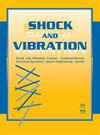Experimental Study and Seismic Response Evaluation of Chlorobutyl Rubber-Based Viscoelastic Dampers
IF 1.2
4区 工程技术
Q3 ACOUSTICS
引用次数: 0
Abstract
Conventional viscoelastic devices often use high-damping elastomeric pads, typically made of patented formulations, that are bonded to steel plates. The response properties of these pads under cyclic shear deformations directly influence the load-deformation hysteretic response of the device. Chlorobutyl (CIIR) is a high-damping rubber commonly used in industrial applications. However, this study found that the damping properties of a typical CIIR rubber compound are insufficient for effective structural seismic mitigation at ambient temperatures above 0°C. The goal of this study was to develop a new composite of CIIR, referred to as modified CIIR, with improved damping properties and to compare its performance with that of the reference CIIR rubber. In the first phase of the experimental studies, the viscoelastic characteristics of the reference and modified CIIR rubber materials were evaluated using dynamic mechanical thermal analysis (DMTA) in tension mode. Prototype viscoelastic damper devices were then fabricated from both the reference and modified CIIR rubber materials and subjected to cyclic shear tests at room temperature and various loading frequencies. The results showed that the modified CIIR rubber exhibited significantly improved effective damping compared to the reference CIIR. The final component of this study involved investigating the seismic response of a 2D frame structure equipped with prototype dampers made from both reference and modified CIIR materials, using nonlinear time-history analyses. The analysis results indicated that the modified CIIR rubber can be effectively utilized in the seismic response mitigation of structures.氯丁基橡胶粘弹性阻尼器的实验研究和地震响应评估
传统的粘弹性装置通常使用高阻尼弹性垫,通常由专利配方制成,粘接在钢板上。这些垫片在循环剪切变形下的响应特性会直接影响设备的负载-变形滞后响应。氯化丁基橡胶(CIIR)是工业应用中常用的高阻尼橡胶。但本研究发现,典型的 CIIR 橡胶复合物的阻尼特性不足以在 0°C 以上的环境温度下实现有效的结构减震。本研究的目标是开发一种具有更好阻尼特性的新型 CIIR 复合材料(称为改良 CIIR),并将其性能与参考 CIIR 橡胶进行比较。在实验研究的第一阶段,使用拉伸模式下的动态机械热分析(DMTA)评估了参考和改良 CIIR 橡胶材料的粘弹特性。然后用参考材料和改性 CIIR 橡胶材料制作了粘弹性阻尼器原型,并在室温和不同加载频率下进行了循环剪切试验。结果表明,与参考 CIIR 相比,改良 CIIR 橡胶的有效阻尼明显提高。本研究的最后一个部分是利用非线性时序分析,对装有由参考材料和改良 CIIR 材料制成的原型阻尼器的二维框架结构的地震响应进行研究。分析结果表明,改进型 CIIR 橡胶可有效用于减轻结构的地震响应。
本文章由计算机程序翻译,如有差异,请以英文原文为准。
求助全文
约1分钟内获得全文
求助全文
来源期刊

Shock and Vibration
物理-工程:机械
CiteScore
3.40
自引率
6.20%
发文量
384
审稿时长
3 months
期刊介绍:
Shock and Vibration publishes papers on all aspects of shock and vibration, especially in relation to civil, mechanical and aerospace engineering applications, as well as transport, materials and geoscience. Papers may be theoretical or experimental, and either fundamental or highly applied.
 求助内容:
求助内容: 应助结果提醒方式:
应助结果提醒方式:


